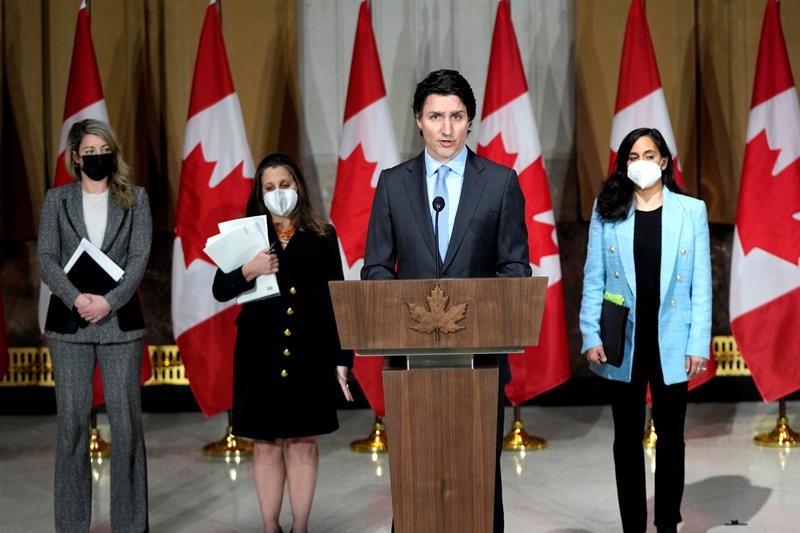LVIV, Ukraine — Almost a year ago, Prime Minister Justin Trudeau, flanked by three of his top ministers, took to a podium in Ottawa and declared the world had changed overnight.
“This morning Ukrainians woke up to the brutal, terrifying reality of war,” Trudeau said on February 24, 2022, after rockets and airstrikes descended on the country early in the morning as Russian tanks rolled toward the capital, Kiev.
“Russian violence, aggression and violations of international law will not go unpunished,” he said as silence filled the huge room.
Since then, the invasion has destabilized families, economies, and the world order. Almost a year later, thoughts turn to rebuilding what was lost and finally claiming a sense of justice.
“The horrors of genocide and war crimes that have occurred are unforgivable,” Ihor Michalchyshyn, executive director of the Ukrainian-Canadian Congress, said in an interview in Ottawa.
No one knows exactly how or when the war will end, but Michalchyshyn said Russia must be held accountable.
“I think that would be a nightmare scenario where the war ends and the judiciary fails. But I don’t think it will be like that,” he said.
Foreign Minister Mélanie Joly last week expressed solidarity with a two-day visit to Ukraine ahead of the anniversary to discuss what that accountability will look like.
She spoke with Ukrainian President Volodymyr Zelenskyy on “the issue of crimes against humanity, war crimes, the crime of aggression and also crimes related to sexual violence,” Joly said at a virtual news conference in Kraków, Poland on Thursday.
Ukraine’s Attorney General Andriy Kostin told Joly the country has already identified 60,000 war-related crimes.
The International Court of Justice and the International Criminal Court have already been tasked with investigating and prosecuting war crimes and crimes against humanity committed by Russian forces, but the crime of aggression does not fall within their respective mandates.
“We have joined the core group of countries that believe there should be a special tribunal for the crime of aggression,” Joly said.
The United Kingdom also belongs to this group of countries.
Meanwhile, Ukrainians at home and abroad continue to live with the aftermath of the war.
“Ever since it started, it’s seemed like a nightmare,” said Halyna Dmytryshyn, who sits at the kitchen table in the small apartment she shares with her son and stepson in Ottawa.
For months after the invasion, she stayed in her home community, just outside of Ivano-Frankivsk in western Ukraine. Eventually, she decided that her child’s conditions were deteriorating, and she left.
“I want the war to end as soon as possible, but I know it’s just impossible… and the worst part is that everyone is getting used to it, and so is the world.”
Even in Lviv, a relatively safe region in western Ukraine near the Polish border, air raid sirens sound several times a day as a reminder of the constant danger to the civilian population. Many people don’t heed the warnings, unwilling to seek cover in basements every time they go off.
Since the initial invasion, Ukraine has driven the Russian military out of the capital and forced the invaders to abandon territory in the northeast. The Ukrainians also regained some conquered communities in the south-east of the country.
Still, the war that winter took a heavy toll on the country’s population as fierce fighting continued along Russia’s border and Russia appeared to focus airstrikes on energy infrastructure, leaving Ukrainians without electricity or heat in the dead of winter.
Western allies, initially fearful of escalating the conflict by offering Ukraine weapons that could incite Russian President Vladimir Putin, have sent increasingly advanced and deadly weapons to help Ukraine defend itself.
In a recent attempt to repel a spring offensive, Canada joined other allied countries in donating modern main battle tanks to Ukraine’s arsenal.
“The limits of what counts as a weapon that can be made available to Ukraine have constantly shifted,” said Roland Paris, a professor of international affairs at the University of Ottawa and a former senior foreign policy adviser to Trudeau.
Last year, Canada committed more than $5 billion to help Ukraine, including more than $1.2 billion in military aid.
While no one can be sure how the conflict will end, Paris said the most compelling assessments indicate it will be a long time coming.
He said it could become a “frozen conflict in which there are ongoing hostilities of varying intensities, with perhaps periods of lulls and even truces.”
It’s a possibility that worries Michalchyshyn, but he said his fears of that scenario are tempered by talk of international justice, criminal courts and accountability.
“That kind of gets us through,” he said.
No matter what comes out of these trials, Dmytryshyn said in a way, the nightmare shared by Ukrainians will never really be over.
“I always pray for the war to end, but that’s not a problem because it will never leave us,” she said.
“We have changed. We have changed a lot and no one will be the same.”
This report from The Canadian Press was first published on February 19, 2023.
Laura Osman, The Canadian Press
Don’t miss interesting posts on Famousbio
